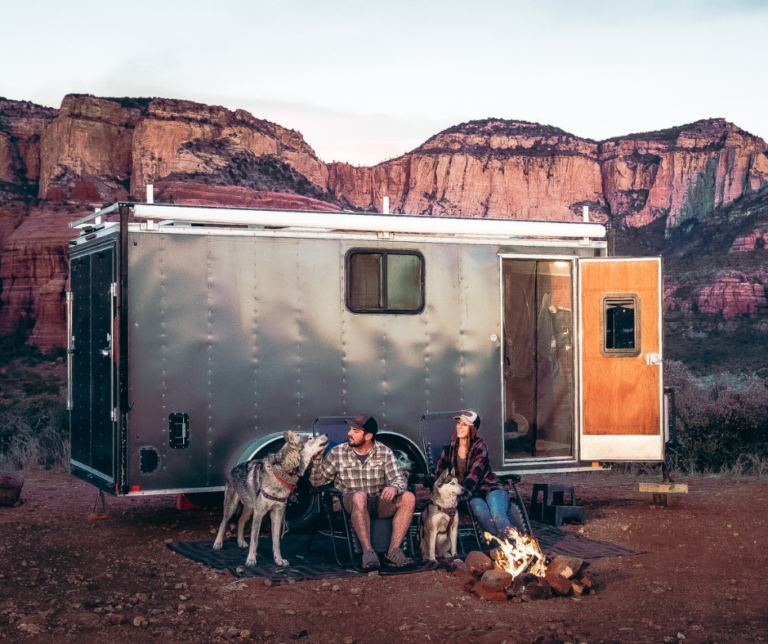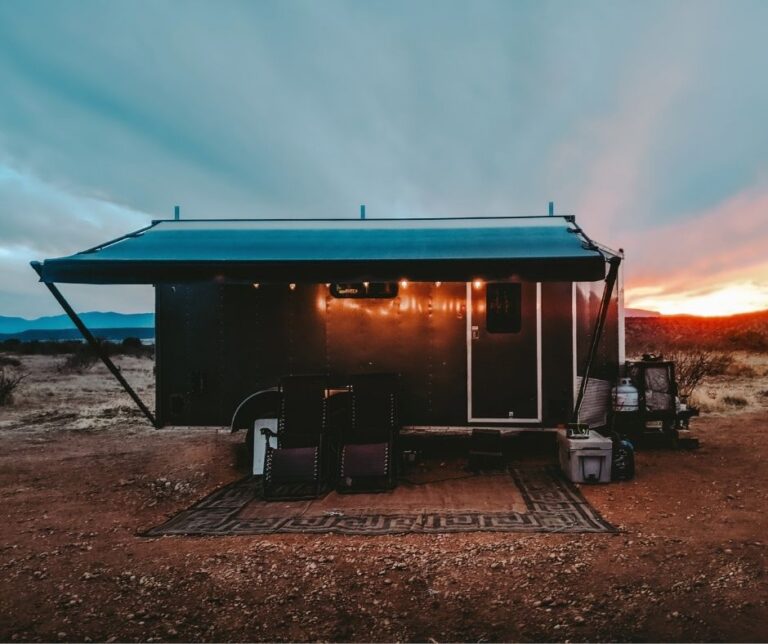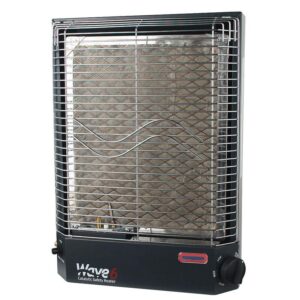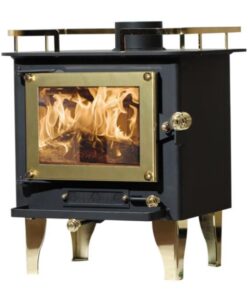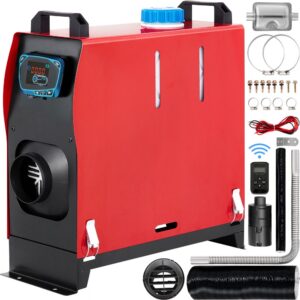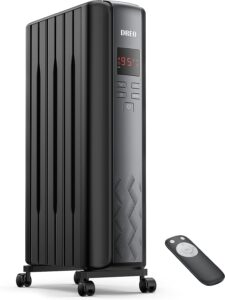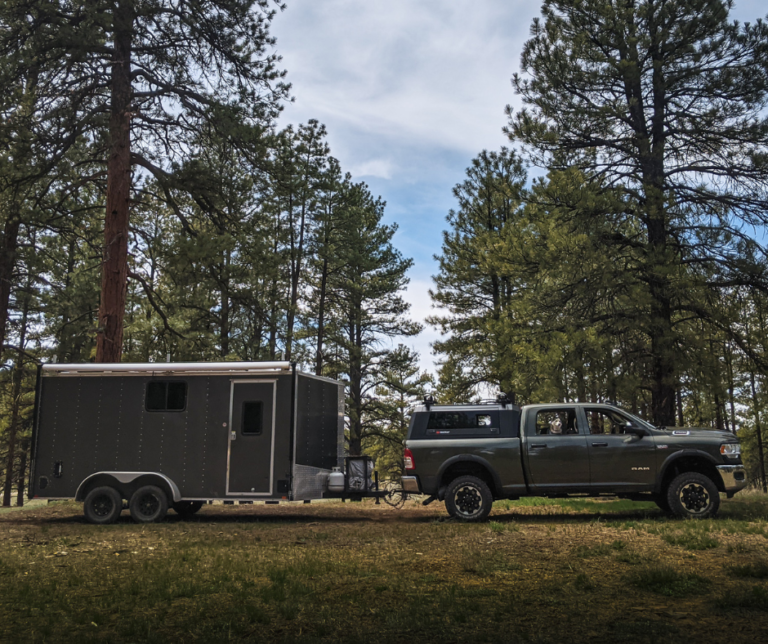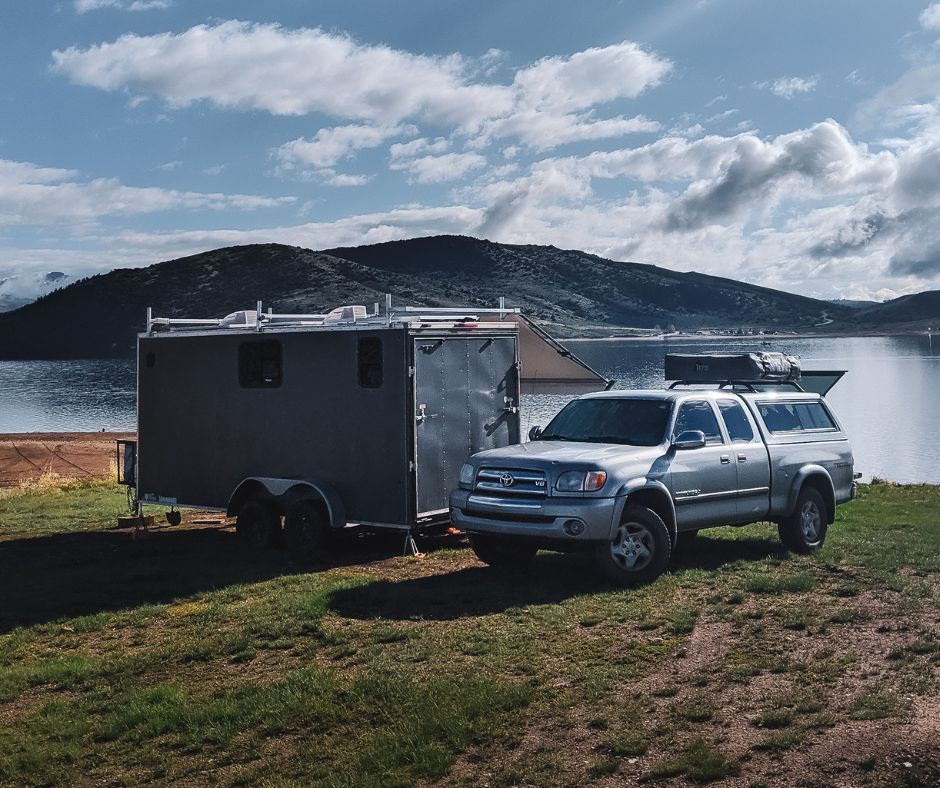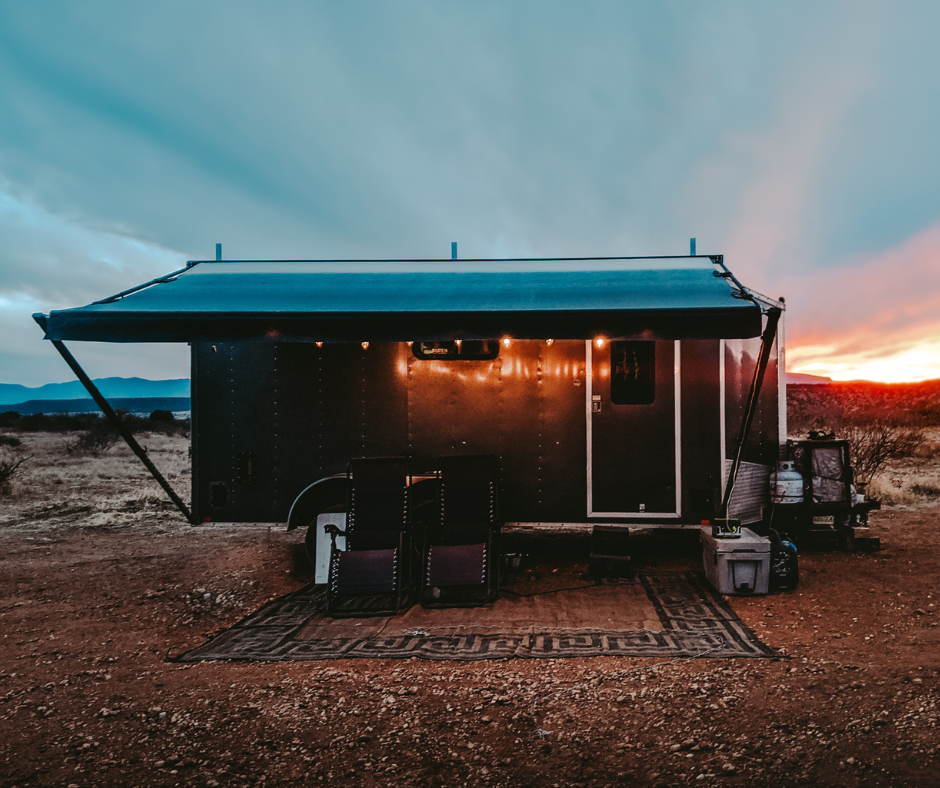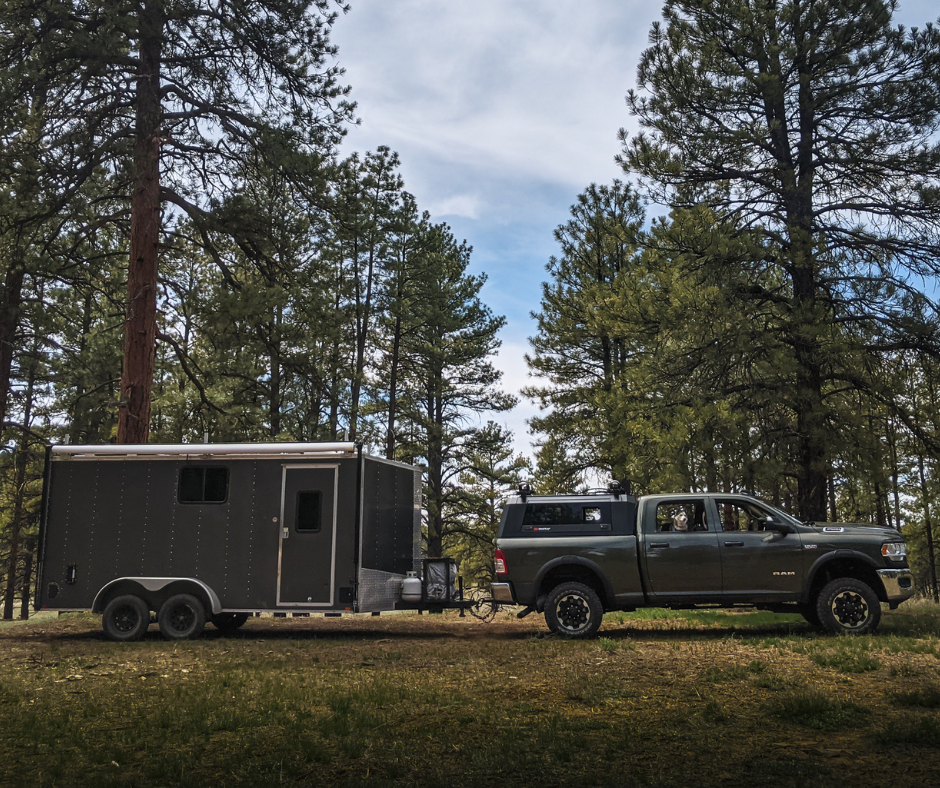How to Heat A Cargo Trailer in the Winter (Propane, Diesel Heaters, or a Wood Stove?)
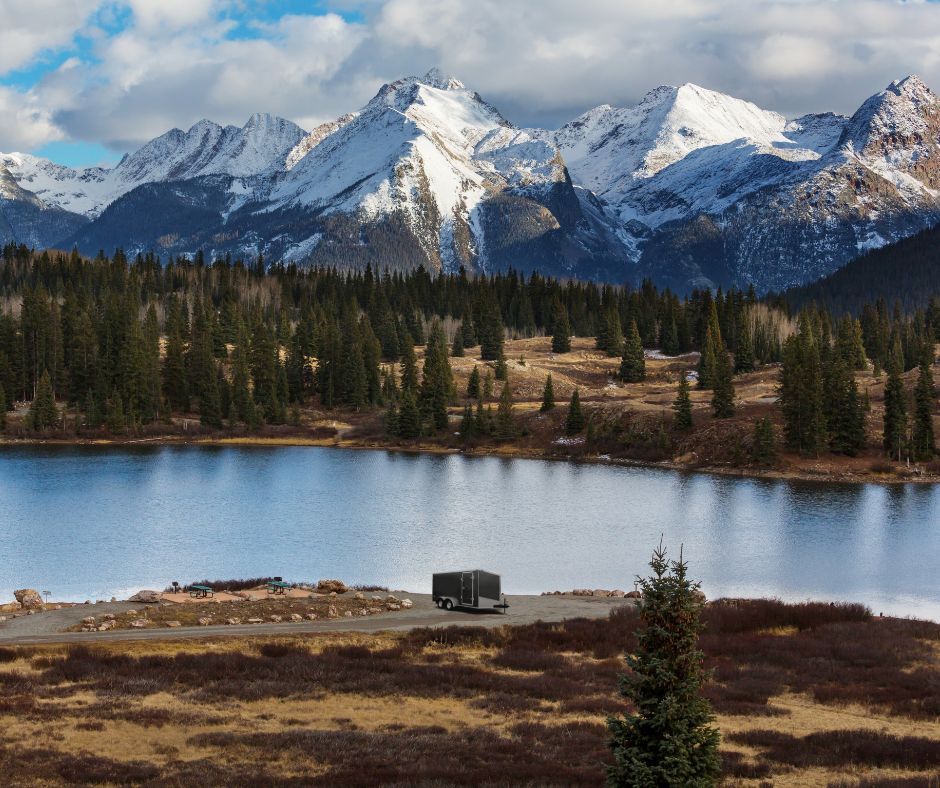
In 2019, my wife and I converted a 7×16 cargo trailer into our full-time home, and we lived in it for over 3 years.
But, as the seasons changed and colder temperatures rolled in, we realized the importance of a reliable heating system to keep us warm and comfortable during our winter adventures.
Initially, I purchased a Mr. Buddy propane heater. But it turned out to be a real propane hog and had risky CO2 emissions. On top of that, it caused excessive condensation, which was not ideal for the trailer’s interior.
Affiliate Disclaimer: Affiliate links may be sprinkled throughout this awesome, helpful, and completely free content. I’ll receive a small commission when you purchase from my links (at no extra cost to you), which I’ll absolutely blow on adult things like dirt bike parts and dog toys.
After completing a few more projects for the cargo trailer, my DIY enthusiasm led me to install a mini wood stove, and boy, did it bring the heat. And while the dry warmth it provided was fantastic, it also devoured precious square footage, making our living quarters feel a bit cramped.
Realizing the wood stove wasn’t the perfect fit, we gave the Wave 3 heater a shot. Unfortunately, it was woefully undersized for our cargo trailer, leaving us chilly and disappointed. We quickly made the switch to the Wave 6 model, which proved to be much more effective.
In this blog post, we’ll share our firsthand experience and knowledge, as well as the best options we’ve discovered for heating your cargo trailer, including propane heaters, diesel heaters, wood stoves, and electric heaters.
Table of Contents
ToggleFactors to Consider When Choosing a Heating Method
Size and Insulation of the Cargo Trailer
When deciding on a heating method for your cargo trailer, there are two things you need to keep in mind—the trailer’s size and its insulation (or lack thereof!).
The trailer’s dimensions will significantly influence how much oomph your heater needs to have. Bigger trailers need more heating power—it’s as simple as that.
Take a 7×16 cargo trailer, for example. You’ve got 112 square feet of living space, but when it comes to heating, you might want to plan for at least double that, say around 224 square feet, for sufficient heat distribution.
Insulation also plays a crucial role in retaining the generated heat and keeping the interior warm. But hey, we get it, some DIYers or budget-conscious folks might skip the insulation step when converting a cargo trailer.
No worries—if that’s you, just know you’ll need a heater that packs a bit more punch to keep things comfortable.
When it comes to insulation, consider the following:
Insulation Material: Choose high-quality insulation materials with a high R-value. This value represents the material’s thermal resistance, with higher R-values offering better insulation. We went with a 2-inch foam board.
Coverage: Insulate all areas of the trailer, including the walls, floor, and ceiling. Pay attention to windows and doors, as they are common spots for heat loss. Consider using dual-pane windows, as they offer improved thermal protection.
Sealing: Ensure that all seams, joints, and gaps in the trailer’s structure are properly sealed to prevent air leaks, which can compromise the effectiveness of insulation.
Best Heaters to Keep A Cargo Trailer Conversion Warm
Propane Heaters
Propane heaters are first on our list for a reason. They come in all shapes and sizes, and the beauty of using them is they offer reliable, constant heat. That means you can set it and (mostly) forget it—your space will stay warm without requiring constant adjustments or monitoring.
Pros
- Compact and lightweight for easy transport and setup
- Don’t require electricity, ideal for remote or power-outage areas
- Offer instant, adjustable heat
- Equipped with safety features like tip-over protection and oxygen sensors
- High energy density allows for extended use
Cons
- Needs good ventilation due to CO2 output
- Fuel can be costly, especially in winter (We’ve been known to go through a 10-gallon propane tank within 5 to 7 days.)
Best propane heaters for cargo trailer conversions
Mr. Buddy Heater
The Buddy Heater is a versatile and portable little heater. Plus, it’s budget-friendly, which is also a huge bonus.
The Buddy heater runs off 1LB green propane bottles. But those small green bottles have their limits. On high heat, they’ll keep you warm for about 5-6 hours. To extend runtime, a 20-pound propane tank can be used with an adapter hose kit.
While effective, Buddy Heaters consume propane and emit more CO2 than some alternatives. It’s not a deal-breaker, but it’s important to be aware of. And, at altitudes over 7,000 FT above sea level, the heater may shut off.
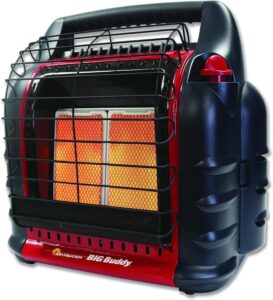
Wave 6
While I still wanted the reliability and energy efficiency of a propane heater, I was determined to find one that didn’t consume excessive amounts of fuel and had a higher safety rating.
This led me to discover the Wave 3, the smallest member of the Olympic Wave heater family. However, after enduring a few chilly nights, I realized its heating capacity was insufficient for my needs. So, I upgraded to the Wave 6, (and it heated up the trailer so much better).
After using it 24/7 on those cold winter months for 2 seasons, it never let me down. For that reason, it would be the first heater I would buy again.
Wood Stove
After surviving my first winter with the Mr. Buddy heater, I encountered an issue with condensation. Determined to find a solution, I came up with the idea of installing a wood stove in my cargo trailer, even though I had never operated one before. I know you might be wondering—Can a cargo trailer even accommodate a wood stove?
I ordered a small wood stove on Etsy and installed it in my trailer. Let me tell you, that thing produced insane amounts of heat, putting my Mr. Buddy heater to shame. Even at -15F outside, I had to open the windows to reduce the heat.
Over time, I learned how to operate the stove properly, although I got smoked out on multiple occasions.
Eventually, I decided to remove the wood stove to create more space for cabinets and storage, which is the only major downside of having a wood stove—they take up a significant amount of space.
Pros
- Provides significant heat output, even in extremely cold temperatures.
- Creates a cozy and inviting atmosphere with the crackling fire.
- Reduces reliance on other heating sources, such as electric heaters or propane furnaces.
- Allows for cooking and boiling water, providing versatility.
- Can be fueled by wood, which is a renewable and often readily available resource.
- Adds a rustic and charming aesthetic to the trailer.
Cons
- Takes up a considerable amount of space, limiting storage and living area.
- Requires proper ventilation and installation to prevent smoke and carbon monoxide buildup.
- Regular maintenance and cleaning of the stove and chimney are necessary.
- Wood sourcing may require additional effort and cost, especially when traveling or living in remote areas.
- The initial cost of purchasing and installing a wood stove can be relatively high.
- Fire safety precautions need to be followed diligently to avoid accidents and potential damage to the trailer.
Best Wood Stoves for Cargo Trailer Conversions
Cubic Mini
This little wood stove is pretty amazing. It’s compact but incredibly effective, making it a real go-to for small spaces.
Despite its size, the Cubic Mini can really crank out the warmth. Many users report that even in sub-zero temperatures, this little guy keeps the inside toasty, sometimes too toasty.
But what about fuel? Well, it’s a wood-burning stove, which means you can use wood pellets or small logs.
Ease of installation is another win. While you might need some basic tools and a bit of know-how, most people find installing their Cubic Mini to be a pretty straightforward process.
You might also like: Best A/C Units To Keep Your Cargo Trailer Conversion Cool
Diesel Heaters
Diesel Heaters are worth considering, I personally have not used one before, but many full-timers and friends we have spoken highly of them.
One major advantage is their efficient fuel consumption, as they provide substantial heat output without burning through too much fuel.
Plus, unlike propane heaters, diesel units don’t emit water vapor, which means less condensation inside your space.
Pros
- Diesel heaters are fast and efficient at heating big spaces
- Diesel fuel is easy to find, making refills a breeze
- Often a cheaper option for fuel in the long run
- No condensation, keeping the interior free from moisture
Cons
- Higher upfront cost compared to other heaters
- Installation can be complex, possibly requiring expert help
- Some units may give off a diesel smell during use
Best diesel heaters for cargo trailer conversions
VEVOR Diesel Heater
The VEVOR diesel heater is popular for its high heat output of up to 27,297 BTUs. You can control it easily with an LCD screen or a remote control.
One of the big perks is that it’s fuel-efficient, so you’ll get a lot of heat without using too much diesel. Unlike some other options, it doesn’t produce condensation, making it a solid choice for indoor use.
Keep in mind that installation might require some technical know-how, and you may notice a slight diesel odor when it’s running.
Electric Heaters
Electric heaters are a convenient option for warming up a cargo trailer, especially if you have easy access to electricity. They’re generally plug-and-play, meaning you can just plug them into an electrical outlet and enjoy instant heat. Plus, they’re clean—no fumes or fuel to deal with. However, electric heaters can draw a lot of power, so they’re not the best choice for off-grid use.
Pros
- No fumes or need for venting.
- Many electric heaters are compact and easy to move, allowing you to direct heat exactly where you need it.
- Easy to Use. Just plug it in and set the temperature.
Cons
- You’ll need a consistent electrical source, limiting off-grid use.
- Electric heaters work best in well-insulated spaces. If your cargo trailer isn’t well-insulated, you might find that you’re losing a lot of the heat you’re paying for.
- They can take up valuable floor space in your trailer.
- Some models may not provide enough heat for very cold conditions.
Best Electric Heater For A Cargo Trailer Conversion
Dreo oil-filled radiator heater
The Dreo oil-filled radiator heater is a solid choice for keeping small to medium-sized rooms warm.
It offers multiple heat settings and a thermostat, so you can find just the right temperature. What’s great is that the heater continues to radiate warmth even when it’s turned off.
When we visit my parents in the winter (and we’re plugged into shore power), this heater is our go-to choice, so we don’t use up all our propane.
One of the best parts? It’s whisper-quiet. Seriously, it’s so hushed you’ll forget it’s even on until you realize you’re toasty warm.
How Many BTUs Do You Need for Your Cargo Trailer Conversion?
To figure out how many BTUs you’ll need for your cargo trailer conversion, you can use a BTU calculator. Just enter your trailer’s interior dimensions, the level of your insulation (which is often “poor” in conversions), and how much you want to raise the temperature. The calculator will provide you with the estimated BTUs you’ll need.
Safety Tips for Heating Your Cargo Trailer
- Ventilation: Using propane heaters in enclosed trailers can be dangerous due to carbon monoxide (CO) poisoning. Carbon monoxide is a colorless, odorless, and tasteless gas that can be deadly if inhaled in high concentrations. In enclosed trailers without adequate ventilation, carbon monoxide can accumulate rapidly and can lead to symptoms such as headaches, dizziness, nausea, confusion, and even loss of consciousness. Always ensure good airflow!
- Install smoke alarms and carbon monoxide detectors: Ensure that your cargo trailer is equipped with working smoke alarms and carbon monoxide detectors. Test them regularly to make sure they are functioning properly.
- Fire extinguisher: Keep a fire extinguisher readily accessible near your heating system. Know how to use it effectively and make sure it’s not expired.
- Properly store fuel: If you are using propane, wood, or gas, store the fuel in approved containers in a well-ventilated area outside the trailer living/sleeping area.
How to heat a Cargo Trailer in the Winter—FAQ
How can I heat my trailer without electricity?
If you need to heat your trailer without electricity, propane heaters, diesel heaters, and wood stoves are your best options.
Is it safe to use a Buddy heater in an enclosed trailer?
Buddy Heaters are designed for indoor use, including in enclosed spaces like a cargo trailer. Just make sure you’ve got good ventilation!
How to Heat Your Cargo Trailer Final Thoughts
Having been through the journey ourselves, we’ve tried all kinds of heating solutions in our cargo trailer—from DIY wood stove setups to commercial heaters like the Wave 6.
Each comes with its pros and cons, and the best option for you will largely depend on your unique circumstances. Got loads of space? Awesome. Running on solar power? Cool, cool. Planning to camp in an Arctic tundra? Well, you brave soul, plan accordingly.
We sincerely hope this article has provided you with valuable insights and practical tips for staying warm during your cargo trailer adventures, especially in the winter months.
Trust us, when you’re sitting in a toasty cargo trailer while the snow falls gently outside, you’ll thank yourself (and maybe even us a little) for taking the time to sort out your heating situation.



